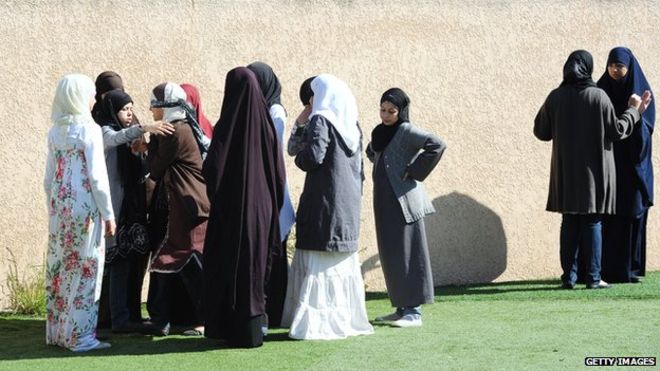
A 15-year-old Muslim girl in France was sent home from school for wearing a long black skirt after it was deemed a violation of the country’s ban on religious clothing in state schools.
The girl, named as Sarah K, was sent home twice in one month from the Léo Lagrange High School in the eastern town of Charleville-Mézières. According to a local education official, Patrice Dutot, the girl was “asked to come back with neutral clothing and it seems her father did not want the pupil to return to school.”
Sarah K told local newspaper L’Ardennais that her skirt was “nothing special, it’s very simple, there’s nothing conspicuous. There’s no religious sign at all.”
France’s controversial 2004 ban on religious symbols and clothing in public schools covers all “ostentatious signs of religion”, including the Jewish yarmulke, Christian crosses, Muslim veils and Sikh turbans.
However, the ban is perceived by many to disproportionately target the Islamic veil, to the point where it is often referred to as the “French veil ban” in international media. It is understood that Sarah K was not wearing a headscarf when she was sent home, having removed it before entering the school.
Sarah K’s story prompted widespread outrage both inside and outside the country. At one point, the hashtag #JePorteMaJupeCommeJeVeux (“I wear my skirt as I please”) was trending on Twitter in France. The hashtag has had more than 45,000 tweets since Tuesday.
Runway models wear long skirts/models & its haute couture, but a Muslim does it and its a threat to secularism #JePorteMaJupeCommeJeVeux
— Zainab M (@realslimzainny) April 29, 2015
I’m confused. Is freedom being told what to wear or choosing what to wear? #JePorteMaJupeCommeJeVeux
— Amal Ahmed Albaz (@AmalAlbaz) April 29, 2015
Where does secularism end and islamophobia start? #JePorteMaJupeCommeJeVeux
— Maria Shahid (@PropJourn) May 3, 2015
According to Léo Lagrange’s head teacher, the decision to send Sarah K home came in the context of “other more visible incidents related to the wearing of headscarves.” Approximately 130 schoolgirls were sent home last year in the country for wearing long skirts according to the Collective Against Islamophobia in France.
In 2011, France banned the full-face veil – also known as the niqab or burqa – in public places, and was the first European country to do so. The ban attracted wide criticism, particularly from outside the country, from those who saw it as an affront to freedom of expression.
However, the European Court of Human Rights upheld the ban in July 2014 after a case against it was raised by an unnamed 24-year-old French Muslim woman. The woman argued that the ban was “inhumane and degrading and against the right of respect for family and private life, freedom of thought, conscience and religion”, also labelling the ban as “discriminatory”.






Comment (1)
[…] bodies. Earlier this year, the hysteria surrounding this issue saw a French Muslim schoolgirl being sent home from school for her skirt being “too long.” In fact, throughout the world, it is seen as […]